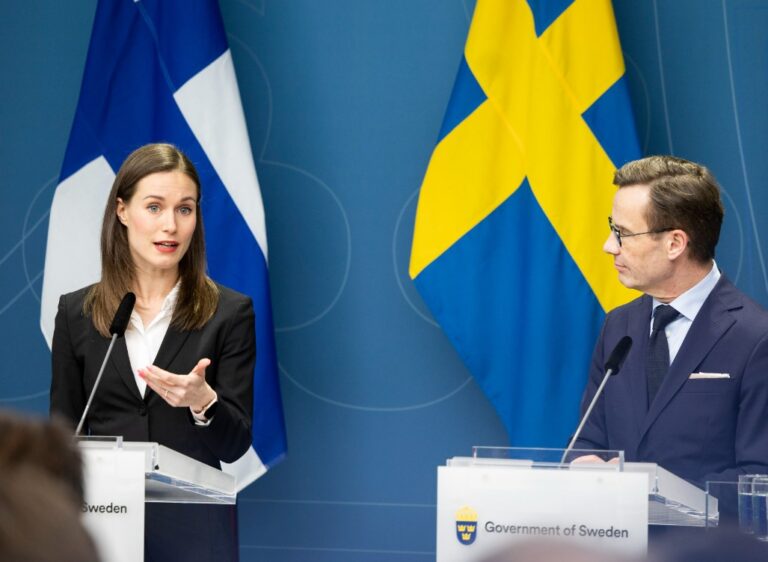Sweden and Finland’s entry into NATO is not as obvious as it seems. The two countries, after formally applying for membership last May and beginning the ratification process in July, are still awaiting the signatures of Hungary and Turkey in order to join the Atlantic Alliance.
NATO, in fact, requires each member country to sign off on its enlargement by parliamentary vote. And, if unanimity is lacking, the process is scrapped.
Budapest and Ankara have placed “strings and ties” of a different nature to untie in order for Stockholm and Helsinki to join NATO.
Table of Contents
Sweden and Finland joining NATO, Hungary’s position
Hungary, through the voice of Prime Minister Viktor Orban, has reported that the parliament will make a decision on the matter “during the first session” in 2023.
Hungary’s stalling attitude can be explained by the country’s energy dependence on Russia. Which has forced the government in Budapest into exceedingly cautious attitudes regarding the conflict in Ukraine. To the point of being deemed – wrongly – even sympathetic to the Kremlin’s cause.
In reality, Hungary is a frontline NATO member in the defense of the Alliance’s eastern front. Although it does not use the alarmist tones used by Poland. The deployment of a NATO Battle Group within its borders demonstrates Budapest’s commitment to the collective defense mechanism.
Sweden and Finland in NATO, the turkish position
Of an entirely different tenor and scope, however, are the “ties” placed by Turkey.
Recently Swedish Prime Minister Ulf Kristersson went so far as to say that Ankara “also wants things that we cannot and do not want to give.” But, despite this, he says he is confident that Turkey will approve the membership application.
Finland and Sweden signed a three-way agreement with Turkey in 2022 aimed at overcoming Ankara’s objections to their membership in the North Atlantic Treaty Organization.
When the two Scandinavian countries applied to join NATO in May in response to Russia’s invasion of Ukraine, Turkey had objected. And accused them of harboring terrorists from the Kurdistan Workers’ Party (PKK), which is considered outlawed. The issue raised by the Swedish premier is still related to the asylum granted to Pkk militants.
“From time to time, Turkey mentions people they want to see extradited from Sweden. I responded that these matters lies within Swedish law,” Kristersson further reported. Indeed, Ankara has expressed disappointment with the Swedish Supreme Court’s decision late last year to halt a request to extradite a journalist with alleged ties to Islamic scholar Fetullah Gulen, who Turkey accused of a 2016 coup attempt.
Stoltenberg seek acceleration on the admission process of Finland and Sweden
The Alliance, formally, has not taken a position on the issue, although Secretary General Jens Stoltenberg said it is “unconscionable” not to defend Sweden and Finland. Even though ratification has not been completed by all member states.
For Stoltenberg, it is inconceivable that the Alliance would not act if the security of Sweden and Finland is at risk. Thus wanting to emphasize the need to speed up the ratification of membership and suggesting that, de facto, the two countries are already in NATO. So the process would only be a pro forma.
In fact, the secretary has a point: we have already had occasion to analyze how Sweden and Finland have become increasingly linked to the Atlantic Alliance over the years. This, precisely in response to Russia’s increased aggressive actions toward its neighboring countries.
To dismiss membership as a pro forma, however, may be a mistake on Stoltenberg’s part. Turkey is the Alliance’s most influential and “rebellious” member. Its influence lies not so much in the size of its military, the second largest in NATO after that of the United States. But in its strategic location: a bridge between Europe and the Middle East. But, above all a country in control of the Bosporus and Dardanelles Straits. And thus able to bottle up the Russian Black Sea fleet.
This is why Turkey has a not inconsiderable decision-making weight within the Alliance. And, can afford occasional “headshots” in order to be able to then come to negotiations from positions of strength. Just as is happening with the accession of Sweden and Finland.












